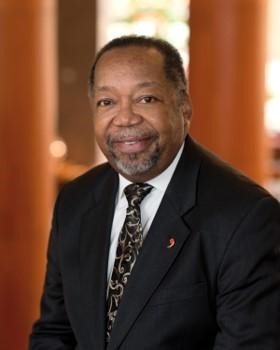“No Justice, No Peace!”
Peace in Community
Rev. Dr. Geoffrey Black
Jeremiah 6:14
They have treated the wound of my people carelessly, saying, “Peace, peace,” when there is no peace. (NRSV)
Reflection: I can remember the first time I heard the words justice and peace linked together. While participating in an anti-police brutality demonstration in New York City in the mid-1980s , I heard the other demonstrators begin to chant, “No Justice, No Peace!” One could hear the chant two ways, as I did later when reflecting on the day. (The second way to hear it, of course, is, “Know Justice, Know Peace!”)
The mantra, “No Justice, No Peace” describes the reality of community life in the United States as it has been since colonial days, through the American Revolution and into the present, because of the persistence of injustice. Enslavement and genocide are grave injustices. America has not come to terms with either. Each has only been compounded by the history of segregation, mass incarceration, lynching, impoverishment and economic exploitation.
It is true that over the course of American history we have lived through wars. We have reached the cessation of hostilities at home and abroad. Yet we have not known peace. At the end of each of these great tragedies, we only return to the context of American injustice, which thrives in communities throughout the United States.
Most recently, a spate of police murders of African American men and women in communities spread as far apart as Louisville, Ky.; Minneapolis, Minn.; and Brunswick, Ga., highlights the truth that racist violence is not only in our past, but remains a present reality. Because there is no justice in American community life, there is no peace. As communities, we deceive ourselves when we pretend that because violence, death and destruction are not at our doorsteps, there is peace.
Here I am speaking of peace as the holistic Biblical shalom, which is at the heart of Just Peace theology and the vision of the Just Peace church. Shalom is a much fuller understanding of peace than simply the end of conflict. Shalom is the communal expression of wholeness, healing, righteousness, equality, fairness and justice working together synergistically.
When we hear the chant as “Know Justice, know Peace,” the chant becomes proscriptive, informing us that it is only when we know justice, engage justice and create just social conditions that we can know shalom, which is the fullest expression of peace. This can be understood as a way forward out of the abyss of racially inspired violence and racial injustice in its many manifestations throughout the United States.
People of color, African Americans, Indigenous/Native American people, Hispanic Americans and Asian American people are determined to struggle against racism and racial injustice. If nothing else, to do so is simply an expression of our humanity. However, the realization of peace in American communities requires that Euro-Americans become equally committed partners in that struggle.
Only then will peace, a “just peace,” be possible.
Practice for Peacemakers: Today’s practice for peacemakers is to not let words get in the way of justice. Sometimes there may be a tempting excuse to hear the chants and to say, “They’re doing this the wrong way! That doesn’t speak to me!” But it is much more helpful to identify injustice and find meaning in the actions that are already being taken to remedy it.
Prayer: Gracious and loving God, we thank you for showing us the way to peace and for inspiring us with a vision of your shalom and your beloved community. We pray that you would grant us wisdom and courage to engage in the struggle faithfully for a just peace. Amen.

The Rev. Dr. Geoffrey Black served as conference minister of the UCC’s New York Conference for nine years beginning in 2000. He was elected general minister and president of the United Church of Christ in 2009, and served in that position until 2015.
This year’s Season of Peace Resources are designed to help participants explore practices for building peace on every scale. From the personal level to global issues, these reflections and prayers will help grow the faith and witness of the whole church. Throughout the 29 days of the 2020 Season of Peace, we are invited to reflect upon:
Week 1 September 6–12: Peace Within
Week 2 September 13–19: Peace in Relationships
Week 3 September 20–26: Peace in Community
Week 4 September 27–October 3: Peace in the World
Final Day October 4: Holistic Peacemaking






No comments:
Post a Comment